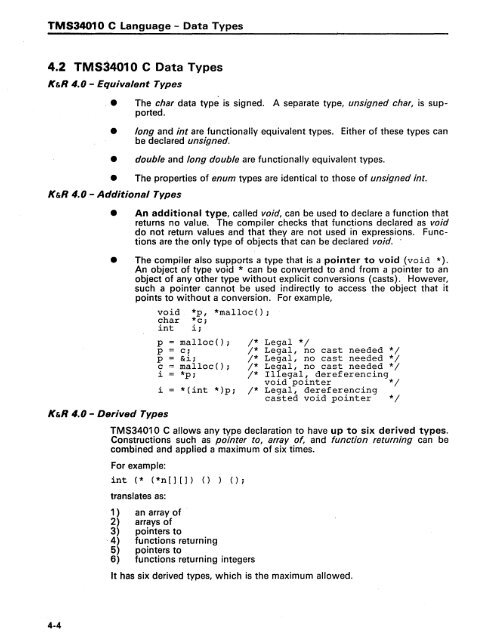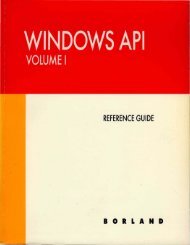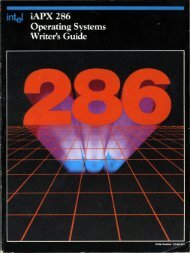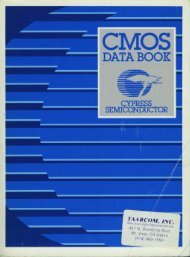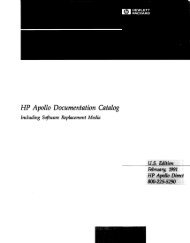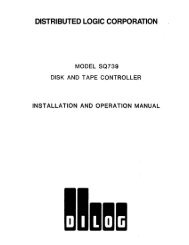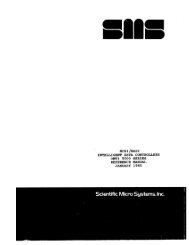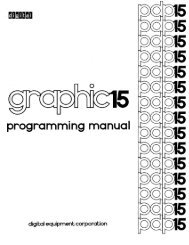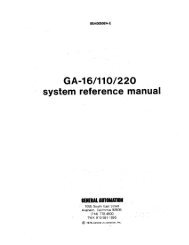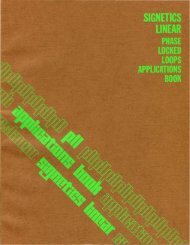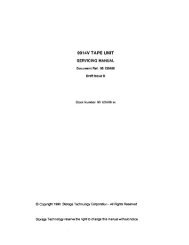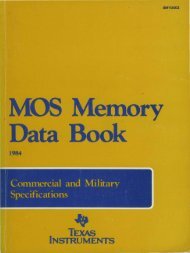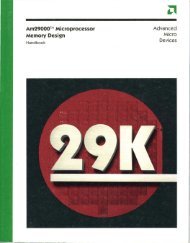TMS34010 C Compiler - Al Kossow's Bitsavers
TMS34010 C Compiler - Al Kossow's Bitsavers
TMS34010 C Compiler - Al Kossow's Bitsavers
Create successful ePaper yourself
Turn your PDF publications into a flip-book with our unique Google optimized e-Paper software.
<strong>TMS34010</strong> C Language - Data Types<br />
4.2 <strong>TMS34010</strong> C Data Types<br />
K&R 4.0 - Equivalent Types<br />
• The char data type is signed. A separate type, unsigned char, is supported.<br />
• long and int are functionally equivalent types. Either of these types can<br />
be declared unsigned.<br />
• double and long double are functionally equivalent types.<br />
• The properties of enum types are identical to those of unsigned int.<br />
K&R 4.0 - Additional Types<br />
• An additional type, called void, can be used to declare a function that<br />
returns no value. The compiler checks that functions declared as void<br />
do not return values and that they are not used in expressions. Functions<br />
are the only type of objects that can be declared void. .<br />
• The compiler also supports a type that is a pointer to void (void *).<br />
An object of type void * can be converted to and from a pointer to an<br />
object of any other type without explicit conversions (casts). However,<br />
such a pointer cannot be used indirectly to access the object that it<br />
points to without a conversion. For example,<br />
void *p, *malloc();<br />
char *c;<br />
int i;<br />
p<br />
p<br />
p<br />
c<br />
i<br />
K&R 4.0 - Derived Types<br />
i<br />
malloc();<br />
c;<br />
&i;<br />
malloc();<br />
*p;<br />
*(int *)p;<br />
/*<br />
/*<br />
/*<br />
/*<br />
/*<br />
/*<br />
Legal */<br />
Legal, no cast needed<br />
Legal, no cast needed<br />
Legal, no cast needed<br />
Illegal, dereferencing<br />
void pointer<br />
Legal, dereferencing<br />
casted void pointer<br />
*/<br />
*/<br />
*/<br />
<strong>TMS34010</strong> C allows any type declaration to have up to six derived types.<br />
Constructions such as pointer to, array of, and function returning can be<br />
combined and applied a maximum of six times.<br />
For example:<br />
int (* (*n[] []) () ) ();<br />
translates as:<br />
1 } an array of<br />
2} arrays of<br />
3) pointers to<br />
·4) functions returning<br />
5) pointers to<br />
6) functions returning integers<br />
It has six derived types, which is the maximum allowed.<br />
*/<br />
*/<br />
4-4


